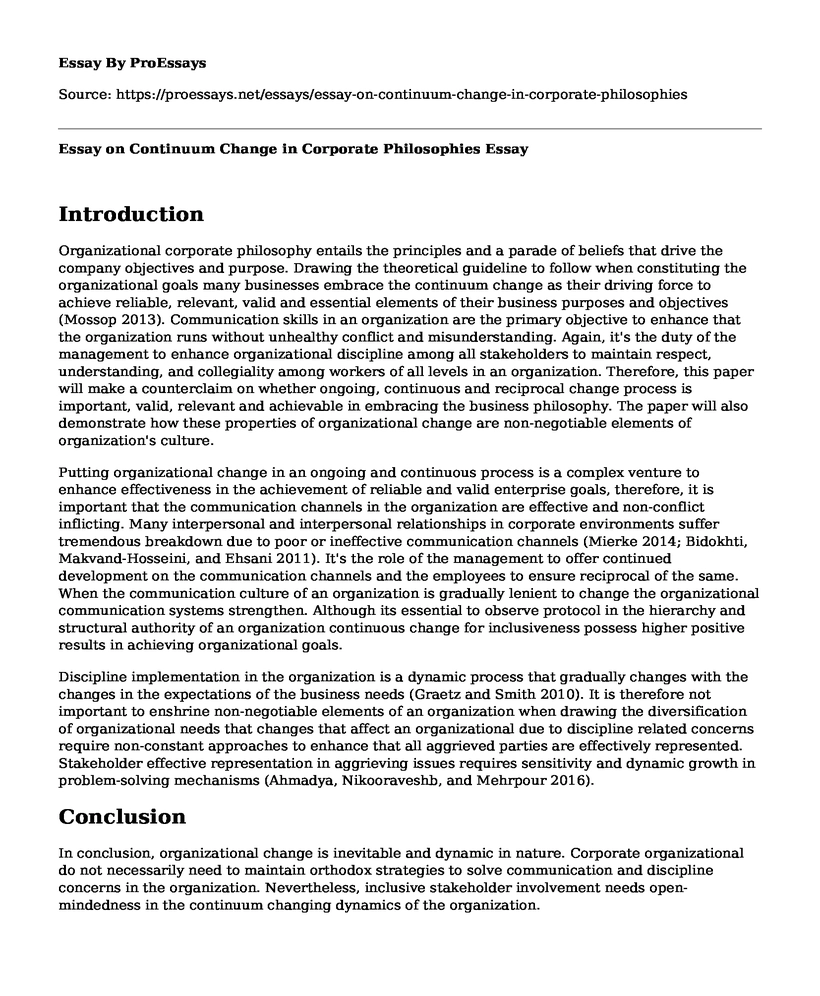Introduction
Organizational corporate philosophy entails the principles and a parade of beliefs that drive the company objectives and purpose. Drawing the theoretical guideline to follow when constituting the organizational goals many businesses embrace the continuum change as their driving force to achieve reliable, relevant, valid and essential elements of their business purposes and objectives (Mossop 2013). Communication skills in an organization are the primary objective to enhance that the organization runs without unhealthy conflict and misunderstanding. Again, it's the duty of the management to enhance organizational discipline among all stakeholders to maintain respect, understanding, and collegiality among workers of all levels in an organization. Therefore, this paper will make a counterclaim on whether ongoing, continuous and reciprocal change process is important, valid, relevant and achievable in embracing the business philosophy. The paper will also demonstrate how these properties of organizational change are non-negotiable elements of organization's culture.
Putting organizational change in an ongoing and continuous process is a complex venture to enhance effectiveness in the achievement of reliable and valid enterprise goals, therefore, it is important that the communication channels in the organization are effective and non-conflict inflicting. Many interpersonal and interpersonal relationships in corporate environments suffer tremendous breakdown due to poor or ineffective communication channels (Mierke 2014; Bidokhti, Makvand-Hosseini, and Ehsani 2011). It's the role of the management to offer continued development on the communication channels and the employees to ensure reciprocal of the same. When the communication culture of an organization is gradually lenient to change the organizational communication systems strengthen. Although its essential to observe protocol in the hierarchy and structural authority of an organization continuous change for inclusiveness possess higher positive results in achieving organizational goals.
Discipline implementation in the organization is a dynamic process that gradually changes with the changes in the expectations of the business needs (Graetz and Smith 2010). It is therefore not important to enshrine non-negotiable elements of an organization when drawing the diversification of organizational needs that changes that affect an organizational due to discipline related concerns require non-constant approaches to enhance that all aggrieved parties are effectively represented. Stakeholder effective representation in aggrieving issues requires sensitivity and dynamic growth in problem-solving mechanisms (Ahmadya, Nikooraveshb, and Mehrpour 2016).
Conclusion
In conclusion, organizational change is inevitable and dynamic in nature. Corporate organizational do not necessarily need to maintain orthodox strategies to solve communication and discipline concerns in the organization. Nevertheless, inclusive stakeholder involvement needs open-mindedness in the continuum changing dynamics of the organization.
List of References
Ahmadya, Gholam Ali; Aghdas Nikooraveshb, and Mehrpour Maryam 2016. Effect of organizational culture on knowledge management based on Denison model, Procedia - Social and Behavioral Sciences 230 ( 2016 ) 387 - 395
Bidokhti, Amin A., Makvand-Hosseini, Sh., & Ehsani, Z. (2011). Investigation of relation between organizational culture and knowledge management in an educational system of Semnan, Iran. Rahbord quarterly journal, 20 (59), 191-216.
Graetz, Fiona, and Smith, Aaron C.T. (2010) Managing Organizational Change: A Philosophies of Change Approach, Journal of Change Management, 10:2, 135-154, DOI: 10.1080/14697011003795602.
Mierke, Jill 2014. Leadership Development to Transform a Library, Library Management 35, 69-77.Mossop, Stephen 2013Achieving Transformational Change in Academic Libraries, Oxford: Chandos.
Cite this page
Essay on Continuum Change in Corporate Philosophies. (2022, May 23). Retrieved from https://proessays.net/essays/essay-on-continuum-change-in-corporate-philosophies
If you are the original author of this essay and no longer wish to have it published on the ProEssays website, please click below to request its removal:
- Thesis Example on Value Stream Management
- Rebel Leadership Essay
- The Causes of the Financial Crisis Paper Example
- Risk Management in Chain Supply - Essay Sample
- TIBO Outsourcing Practice and Security Risks Analysis Paper Example
- Essay Sample on Leadership: A Crucial Component of Society's Security & Development
- Supervisors: Balancing Work and Management Challenges - Essay Sample







